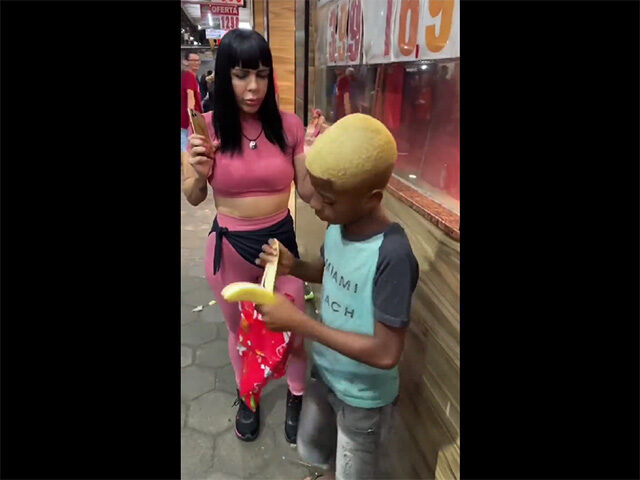Brazilian police on Wednesday announced they are investigating a mother-and-daughter team of social media influencers named Kerollen Cunha and Nancy Golcalves, who sparked outrage by posting videos of themselves offering black children gifts such as stuffed monkeys and bananas.
Kerollen and Nancy have over 13 million followers on TikTok, the controversial video platform owned by China’s ByteDance. In addition to concerns that TikTok spies on its users and mishandles their private information, and could cooperate with Chinese intelligence agencies, the platform is under mounting criticism for pushing toxic content to children.
The duo (who have occasionally described themselves as half-sisters rather than mother and daughter) also have about a million followers on Instagram, plus a YouTube channel. Much of their content is intended to be humorous, although they also do some product reviews for cosmetics.
They have skirted the boundaries of bad taste before, notably in a 2021 video in which they used an app to hail a ride, then spent the drive complaining about the supposedly hideous smell of the black driver’s hair. The driver did not appreciate the joke, which could have significantly damaged his livelihood. The video was eventually taken down by its creators.
In their new controversial video, Kerollen and Nancy approached several young black children on the street with an offer to choose either a small sum of money or a surprise gift. Most of the children chose the gift, and when they opened the brightly-wrapped packages, they discovered prizes such as bananas and stuffed monkey toys.
“Do you like it?” Kerollen asked a young black boy in one clip, after he passed up on $2 in cash to choose a box that turned out to contain a single banana.
WATCH: Rep. Bob Latta Slams CEO of China’s TikTok over Dangerous Trends Killing American Children:
Video Source: House Committee on Energy and Commerce / YouTubeWhen the disappointed boy said “no,” Kerollen insisted, “Take a better look. I’m sure you’ll like that.”
Another video clip showed Kerollen, dressed in a yellow soccer jersey that was meant to evoke supporters of former president Jair Bolsonaro, presenting a young black girl with a box and laughing when she opened it to discover a toy monkey.
The Public Ministry of Rio de Janeiro (MPRJ) said on Wednesday it received almost 700 complaints about the TikTok videos. The complaints were referred to the Specialized Criminal Investigation Prosecutor’s Office, which said its hate crimes unit has opened an investigation.
The offending videos have been deleted from all platforms, apparently by the creators, but copies were preserved by lawyer and human rights advocate Fayda Belo, and the Brazilian police said they have copies as well.
“How far can human cruelty go? Does anyone have any idea how cruelly these two treated those children?” Belo asked in an Instagram post that evidently prompted many of the complaints to the MPRJ.
WATCH: Dem Rep. Moulton: TikTok Threatens Security and Families, It Influences Behavior of Kids:
Belo noted that Brazil has laws against exposing minors to “shame, humiliation, and ridicule in public.”
A lawyer for the two TikTok influencers said they were “shocked” by the allegations and “vehemently deny any form of racial discrimination.”
The Kerollen and Nancy case has disturbing similarities to a rash of racist videos that appeared on China’s tightly government-controlled microblogging platform Weibo last summer. The videos created by Chinese users depicted African children being tricked into singing songs with racially embarrassing lyrics, or shouting self-derogatory statements such as “I am a black monster and I have a low IQ.”
Some of the creators of these videos posed as charity workers, claiming they wished to teach the African children how to speak Mandarin and convincing parents to take their children out of school for the bogus “education” they offered. Some of the children were reportedly beaten with sticks when they did not perform as the Chinese video makers wanted.
TikTok apologized in June 2021 for allegedly suppressing content from black creators and promised to become more “inclusive.” The results of this effort were met with mixed reviews, with some black users complaining their videos were still throttled or taken down more often than similar content created by white users.
Maher: China Gave Us TikTok, the App that “Rots our Children’s Brains”:

COMMENTS
Please let us know if you're having issues with commenting.